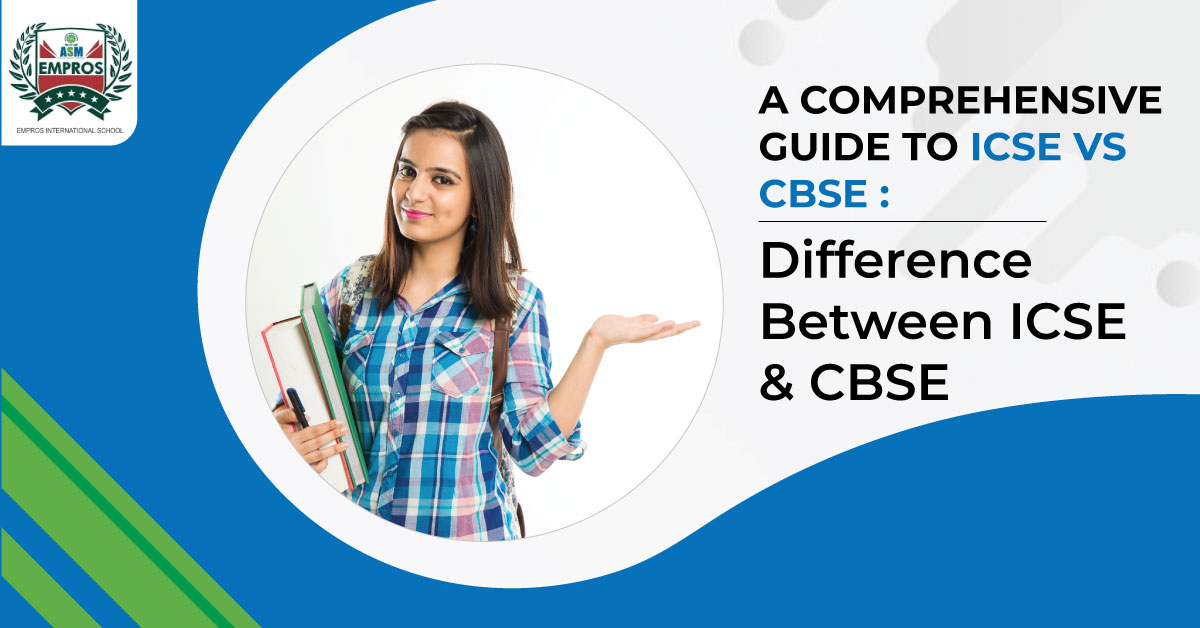ICSE Vs CBSE: An In-Depth Look
The disparities between the ICSE (Indian Certificate of Secondary Education) and CBSE (Central Board of Secondary Education) boards are diverse, encompassing various crucial aspects of a child’s education. A significant difference lies in their curricula. CBSE tends to favour a focused, streamlined approach, with an emphasis on science and mathematics, making it ideal for students aiming for national-level entrance exams such as JEE and NEET. On the other hand, ICSE offers a more extensive curriculum, nurturing diverse subjects like arts, humanities, and languages, fostering a holistic learning experience. The teaching methodologies also differ, with CBSE focusing on theoretical understanding and ICSE placing more emphasis on practical applications, encouraging real-life problem-solving skills.
ICSE’s exams are more comprehensive, testing both objective and subjective aspects while CBSE’s assessments are divided into terms, encompassing multiple-choice, case-based, and open-ended questions. The grading systems also vary significantly, with CBSE using an alphabetical grading system and ICSE employing numeric scores. University recognition adds another layer: CBSE is widely accepted in Indian institutions, while ICSE holds sway in foreign universities, influencing future study options.
The choice between CBSE and ICSE ultimately depends on individual preferences and career aspirations. CBSE may suit those seeking straightforward learning paths and aiming for Indian higher education, while ICSE could benefit those interested in diverse subjects, and analytical skills, and considering foreign universities for further studies.
Overview Of ICSE Board
The ICSE (Indian Certificate of Secondary Education) board is widely respected and esteemed in India and is overseen by the CISCE (Council of Indian School Certificate Examination), a non-governmental education board. The board administers the ICSE examination after 10th grade, and after this, it transitions to ISC (Indian School Certificate) for the 12th grade examination.
Overview Of CBSE Board
The Central Board of Secondary Education (CBSE) is a highly sought-after and prominent education board in India that adheres to the national curriculum and offers various additional subjects. It conducts national-level exams for students seeking admission to undergraduate engineering and medical courses.
What Is the Difference Between ICSE And CBSE Board?
Education in India offers diverse paths through boards like ICSE (Indian Certificate of Secondary Education) and CBSE (Central Board of Secondary Education). The disparities between these boards influence a student’s academic journey, shaping their learning experience and future opportunities. Understanding these distinctions helps in making informed decisions about a child’s education.
1. ICSE Vs CBSE Board: Curriculum and Syllabus
ICSE’s curriculum is comprehensive, encompassing a wide array of subjects—Science, Mathematics, Arts, Humanities, and Languages. In contrast, CBSE focuses on Science and Mathematics, offering a more streamlined syllabus. ICSE nurtures a holistic education, while CBSE prepares students with depth in core subjects, advantageous for competitive exams.
2. ICSE Vs CBSE Board Examination Structure
ICSE examinations combine objective and subjective formats, evaluating various aspects of knowledge. CBSE divides assessments into terms, incorporating multiple-choice, case-based, and open-ended questions. These differing structures reflect distinct evaluation methodologies.
3. ICSE Vs CBSE Board: Evaluation Criteria
ICSE’s grading system involves a numeric approach, while CBSE employs an alphabetical grading system. ICSE’s assessments include internal and external evaluations, with greater weightage given to internal assessments, whereas CBSE balances internal and external evaluations differently.
4. ICSE Vs CBSE Board: Flexibility
ICSE offers flexibility through a broader subject range, including arts, languages, and sciences. In contrast, CBSE provides a more structured approach with fewer subjects, advantageous for focused learning.
5. ICSE Vs CBSE Board: Recognition in Higher Education
CBSE holds stronger recognition within Indian universities and colleges, while ICSE is esteemed by foreign universities. The choice can influence higher education opportunities based on the board’s recognition.
6. ICSE Vs CBSE Board: Language of Instruction
ICSE primarily emphasizes English as the medium of instruction, while CBSE schools have no language preference. ICSE’s focus on language skills gives it an edge in the language instruction domain.
7. ICSE Vs CBSE Board: Textbooks
The choice of board affects textbook selection. While CBSE follows NCERT textbooks, ICSE uses publications by different authors, impacting the learning material and approach.
8. ICSE Vs CBSE Board: Difficulty Level
ICSE is often perceived as more challenging due to its comprehensive curriculum and evaluation pattern. CBSE, with its focused subjects and evaluation approach, is considered relatively less demanding.
9. ICSE Vs CBSE Board: Uniformity Across Regions
CBSE offers more uniformity across regions due to its structured curriculum and standardized assessments. ICSE’s broader curriculum might result in varying teaching methodologies and content delivery across regions.
10. ICSE Vs CBSE Board: National vs. Regional Focus
CBSE’s emphasis is more national-centric, aligning with the Indian education system’s requirements. ICSE’s broader curriculum caters to global and regional perspectives.
11. ICSE Vs CBSE Board: Availability of Resources
CBSE’s popularity ensures abundant resources, study materials, and coaching centres compared to ICSE, which might have relatively fewer resources.
12. ICSE Vs CBSE Board: Grading System
CBSE’s alphabetical grading system simplifies evaluation, while ICSE’s numeric system reflects a different evaluation methodology, impacting how students are graded and assessed.
ICSE Vs CBSE Board Detailed Comparison
When comparing the ICSE (Indian Certificate of Secondary Education) and CBSE (Central Board of Secondary Education) boards, it’s important to understand the differences across various aspects. Let’s delve into a detailed comparison of these two prominent educational boards in India.
| Aspect | ICSE Board | CBSE Board |
| Full Form | Indian Certificate of Secondary Education | Central Board of Secondary Education |
| Curriculum and Syllabus | Comprehensive covering diverse subjects | Focused on core subjects like Science, Math |
| Examination Structure | Mix of objective and subjective assessments | Divided into terms, various question types |
| Evaluation Criteria | Numeric grading, heavier internal assessments | Alphabetical grading, balanced evaluations |
| Flexibility | Broader subject range, more flexible | Structured curriculum with fewer subjects |
| Recognition in Higher Ed | Recognized by foreign universities | Widely accepted within Indian institutions |
| Language of Instruction | Emphasizes English as medium | No specific language preference |
| Textbooks | Utilizes various publications | Follows NCERT textbooks |
| Difficulty Level | Perceived as more challenging | Considered relatively less demanding |
| Uniformity Across Regions | Teaching methodologies might vary | More uniform due to structured curriculum |
| National vs. Regional Focus | Global and regional perspectives | More national-centric |
| Availability of Resources | Relatively fewer resources | Abundant study materials, coaching centres |
Which Is Tough ICSE Vs CBSE?
The ICSE board, overseen by the CISCE (Council for the Indian School Certificate Examination), is renowned for its rigorous standards, often considered one of the most challenging among boards, contrasting with the CBSE system. Success in either board relies on individual performance, and with adequate preparation and planning, students can thrive regardless of the board they choose.
ICSE Vs CBSE: Which Board Is Better for the Development of Your Child?
ICSE nurtures core personality traits and skill development in children, and CBSE focuses on aiding them in achieving their career aspirations. Parents must weigh various factors when selecting a school, delving into distinctions between CBSE and ICSE education boards. These encompass aspects like fostering online learning, promoting reading, arts, and sports, and offering a curriculum aligned with a child’s learning objectives. Innovation and prioritizing educational quality should guide parents in this decision-making process.
Both boards boast advantages and drawbacks, ensuring equally promising futures for students, be it in ICSE or CBSE. Evaluating the strengths and weaknesses of each board enables students and parents to determine the best fit for future endeavours.
Frequently Asked Questions About ICSE Vs CBSE Board
When it comes to choosing between the ICSE and CBSE boards, many parents and students have common questions. Here are some frequently asked questions about these two educational boards:
Q1. Can a student easily switch from ICSE to CBSE Board?
Answer: While a student can switch from ICSE to CBSE, there may be some adjustments required due to differences in curriculum and teaching methodologies. However, with proper planning and support, the transition can be managed effectively.
Q2. What is the significance of board exam scores in ICSE and CBSE?
Answer: Board exam scores from both ICSE and CBSE can have a significant impact on a student’s academic and professional future. These scores are often considered during college admissions and can influence a student’s prospects for higher education and career opportunities.
Q3. What impact do the boards have on college admissions and prospects?
Answer: Both ICSE and CBSE boards are recognized by colleges and universities in India. However, the impact on college admissions and prospects may vary based on the specific institution and its preferences. Students need to research the admission criteria of their desired colleges.
Q4. Which Education System Is Better In India ICSE Vs CBSE?
Answer: The choice between ICSE and CBSE depends on individual preferences, career aspirations, and the learning style of the student. Both systems have their strengths, and the decision should be based on what aligns best with the student’s goals and abilities.
Q5. Which board is better for higher education ICSE or CBSE?
Answer: Both ICSE and CBSE are recognized for higher education in India. The suitability of each board for higher education depends on the specific college or university and its admission criteria. Students should consider their future academic goals when choosing a board.
Q6. Can my child switch boards?
Answer: Depending on the circumstances and the policies of the schools involved, a child can switch boards. However, it’s important to consider the potential challenges and adjustments that may come with such a transition and to ensure that the switch aligns with the child’s academic and personal needs.
Conclusion
The comparison between ICSE and CBSE boards reveals essential elements that shape a child’s academic path. However, the ultimate decision hinges on understanding a child’s unique learning preferences, strengths, and aspirations. The right board choice doesn’t come from a one-size-fits-all approach but from aligning the board’s offerings with a child’s specific educational needs, ensuring a conducive environment for their holistic development.

